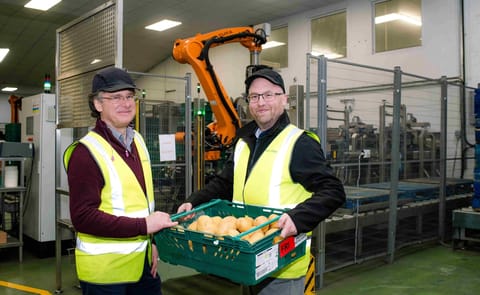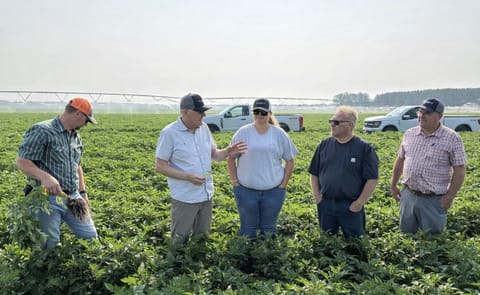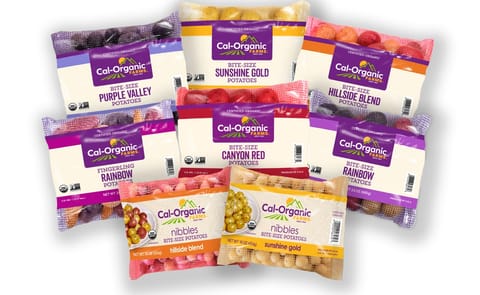The trade of seed potatoes from Great Britain to the EU was immediately banned after Brexit.
主标签
Potato growers in Ireland urged to order seed now for 2023 - or take a huge risk

Brexit could lead to a significant shortage of potatoes for Irish consumers by 2023, experts have warned. It makes sense for potato growers to contact seed producers now to organise fresh seed for the 2023 season, as the Brexit impasse shows no sign of easing.
This will give the seed producer confidence to grow the required seed amounts, for a market that they are sure exists. Otherwise, they are taking a huge risk, to grow for a market that may or may not be there.
Prior to the UK’s departure from the EU, the majority of potato seed used by Irish farmers for varieties such as Kerr Pinks, Golden Wonders and British Queens had been imported from Scotland.
But under post-Brexit rules and following the UK’s departure from the single market, exports of seed potatoes – those not consumed but used to plant other potatoes – from Scotland to Ireland are no longer allowed.

Growers in Garretstown, Co Cork, planting British queens seed potatoes last year. (Courtesy: Denis Boyle)
While this is perfectly fine, growers need to be aware that due to the Brexit impasse between the EU and UK on seed imports from Scotland and Great Britain, this avenue for seed doesn't look like it will be available in the near future.
Shay Phelan, a potato specialist at Ireland’s Agriculture and Food Development Authority:
"It’s a bit of a conundrum, to be honest we’ve limited seed crops growing here and UK potato seed imports are not approved."
"A derogation was sought to import seed, but it wasn’t successful and that will have a big impact on some farmers. If we got access to a derogation for seed growers we could fill the gaps, but even that would take a year or two."
Most growers should have enough seed for this year following a strong crop yield, meaning that consumers are unlikely to see a significant impact until 2023, Mr Shay said.
John Carroll, a grower in County Louth:
"It will be a big issue unless something is done with the seed industry. We don’t save seed because it’s completely different, that’s why there are so few seed growers in Ireland because it’s hard to get right."
The high dry matter varieties that potato growers likes in Ireland are not popular on the continent, with the result that there are few seed growers in Europe prepared to risk growing varieties that they may not have sales for.
Therefore, in order to supply the Irish market, with these types of varieties, the only real option is to produce the seed in Ireland.
Ireland’s agriculture minister Charlie McConalogue has pledged to help revive Ireland’s own seed potato industry, with these efforts heavily reliant on production at the research farm, Tops Farm. But Mr Carroll warned it will take several years to fill the gap left by Brexit.
Thomas McKeown, former national potato chairman of the Irish Farmers Association’s (IFA):
"A great opportunity here for seed growers, but it will take about three years, and it’s going to be a bit of a pain. There’s no quick fix."
Bob Carruth, spokesperson of NFUS :
"While exports of seed potatoes from Great Britain to Northern Ireland have also been banned, the DUP has previously cited potatoes as a food whose strong domestic production means it should be safe from shortages.
Meanwhile, the National Farmers Union Scotland (NFUS) warned that "the loss of the European market was significant" north of the border."
"There aren’t too many major casualties of the Brexit deal, but seed potatoes is undoubtedly one of them because there’s no trade.
So it’s not even an issue in regard to paperwork or transport times, there is no opportunity to export seed potatoes, so that’s certainly something we continue to try and work on at a European level."
Prior to Brexit, Britain exported around 30,000 tonnes of seed potatoes – worth GBP 13.5 m (about USD 16,9 m) – to mainland Europe each year, the majority of which were high-health stocks grown in Scotland, according to NFUS.
Carruth said that most farmers who grow seed potatoes will have other elements to their business, potentially growing different crops and keeping livestock.
Like all Scottish farmers, potato growers will be struggling to cope with the unprecedented increase in input prices, with the cost of fertilizer has soared 300 percent in 18 months and the price of plant protection products has doubled.











